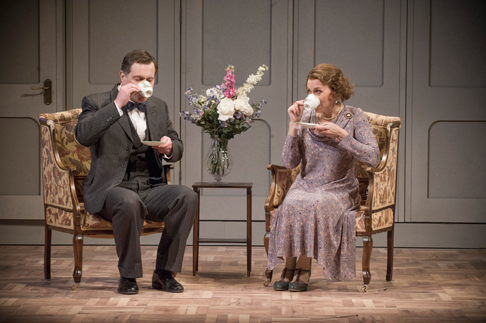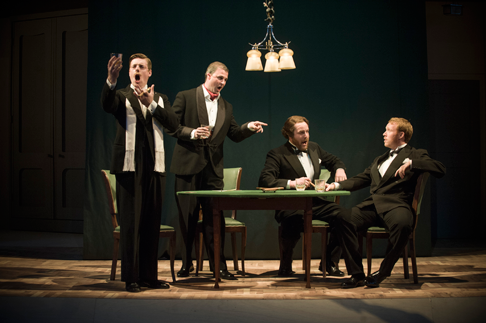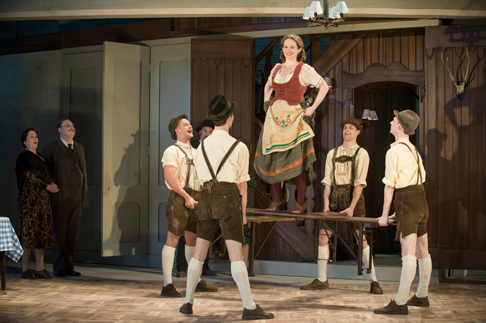![Mary Dunleavy as Christine [Photo by Mike Hoban]](http://www.operatoday.com/Intermezzo-2015-Garsington-Opera-Mary-Dunleavy-Christine-credit-Mike-Hoban.png)
12 Jun 2015
Intermezzo, Garsington Opera
Hats off to Garsington for championing once again some criminally neglected Strauss. I overheard someone there opine, ‘Of course, you can understand why it isn’t done very often.’
English Touring Opera are delighted to announce a season of lyric monodramas to tour nationally from October to December. The season features music for solo singer and piano by Argento, Britten, Tippett and Shostakovich with a bold and inventive approach to making opera during social distancing.
This tenth of ten Live from London concerts was in fact a recorded live performance from California. It was no less enjoyable for that, and it was also uplifting to learn that this wasn’t in fact the ‘last’ LfL event that we will be able to enjoy, courtesy of VOCES8 and their fellow vocal ensembles (more below …).
Ever since Wigmore Hall announced their superb series of autumn concerts, all streamed live and available free of charge, I’d been looking forward to this song recital by Ian Bostridge and Imogen Cooper.
Although Stile Antico’s programme article for their Live from London recital introduced their selection from the many treasures of the English Renaissance in the context of the theological debates and upheavals of the Tudor and Elizabethan years, their performance was more evocative of private chamber music than of public liturgy.
Evidently, face masks don’t stifle appreciative “Bravo!”s. And, reducing audience numbers doesn’t lower the volume of such acclamations. For, the audience at Wigmore Hall gave soprano Elizabeth Llewellyn and pianist Simon Lepper a greatly deserved warm reception and hearty response following this lunchtime recital of late-Romantic song.
For this week’s Live from London vocal recital we moved from the home of VOCES8, St Anne and St Agnes in the City of London, to Kings Place, where The Sixteen - who have been associate artists at the venue for some time - presented a programme of music and words bound together by the theme of ‘reflection’.
'Such is your divine Disposation that both you excellently understand, and royally entertaine the Exercise of Musicke.’
‘And there was war in heaven: Michael and his angels fought against the dragon; and the dragon fought and his angels, And prevailed not; neither was their place found any more in heaven … that old serpent … Satan, which deceiveth the whole world: he was cast out into the earth, and his angels were cast out with him.’
There was never any doubt that the fifth of the twelve Met Stars Live in Concert broadcasts was going to be a palpably intense and vivid event, as well as a musically stunning and theatrically enervating experience.
‘Love’ was the theme for this Live from London performance by Apollo5. Given the complexity and diversity of that human emotion, and Apollo5’s reputation for versatility and diverse repertoire, ranging from Renaissance choral music to jazz, from contemporary classical works to popular song, it was no surprise that their programme spanned 500 years and several musical styles.
The Academy of St Martin in the Fields have titled their autumn series of eight concerts - which are taking place at 5pm and 7.30pm on two Saturdays each month at their home venue in Trafalgar Square, and being filmed for streaming the following Thursday - ‘re:connect’.
The London Symphony Orchestra opened their Autumn 2020 season with a homage to Oliver Knussen, who died at the age of 66 in July 2018. The programme traced a national musical lineage through the twentieth century, from Britten to Knussen, on to Mark-Anthony Turnage, and entwining the LSO and Rattle too.
With the Live from London digital vocal festival entering the second half of the series, the festival’s host, VOCES8, returned to their home at St Annes and St Agnes in the City of London to present a sequence of ‘Choral Dances’ - vocal music inspired by dance, embracing diverse genres from the Renaissance madrigal to swing jazz.
Just a few unison string wriggles from the opening of Mozart’s overture to Le nozze di Figaro are enough to make any opera-lover perch on the edge of their seat, in excited anticipation of the drama in music to come, so there could be no other curtain-raiser for this Gala Concert at the Royal Opera House, the latest instalment from ‘their House’ to ‘our houses’.
"Before the ending of the day, creator of all things, we pray that, with your accustomed mercy, you may watch over us."
The doors at The Metropolitan Opera will not open to live audiences until 2021 at the earliest, and the likelihood of normal operatic life resuming in cities around the world looks but a distant dream at present. But, while we may not be invited from our homes into the opera house for some time yet, with its free daily screenings of past productions and its pay-per-view Met Stars Live in Concert series, the Met continues to bring opera into our homes.
Music-making at this year’s Grange Festival Opera may have fallen silent in June and July, but the country house and extensive grounds of The Grange provided an ideal setting for a weekend of twelve specially conceived ‘promenade’ performances encompassing music and dance.
There’s a “slide of harmony” and “all the bones leave your body at that moment and you collapse to the floor, it’s so extraordinary.”
“Music for a while, shall all your cares beguile.”
The hum of bees rising from myriad scented blooms; gentle strains of birdsong; the cheerful chatter of picnickers beside a still lake; decorous thwacks of leather on willow; song and music floating through the warm evening air.
![Mary Dunleavy as Christine [Photo by Mike Hoban]](http://www.operatoday.com/Intermezzo-2015-Garsington-Opera-Mary-Dunleavy-Christine-credit-Mike-Hoban.png)
Hats off to Garsington for championing once again some criminally neglected Strauss. I overheard someone there opine, ‘Of course, you can understand why it isn’t done very often.’
Well, only if you take as given the increasingly untenable assumptions some ‘major’ opera houses trumpet concerning their audiences – and perhaps not even then. That Birmingham Opera can sell out Stockhausen immediately and that the Royal Opera House – by any standards, a different animal – can sell out operas by Benjamin and Birtwistle puts paid to lazy talk and should put paid to lazy programming, though does so far less often than should be the case. If one takes as one’s core lazy listeners, consequences will follow; if one leads, and especially if one acts upon widespread thirst for modernist repertoire, broadly conceived, other, better consequences will do so. Strauss, it might be countered, is a different matter again, and perhaps he is. But he is hardly unpopular, and if many people have not heard Intermezzo, despite a recent staging at Buxton, then grant them an opportunity such as Garsington has.
 Mark Stone as Robert and Mary Dunleavy as Christine
Mark Stone as Robert and Mary Dunleavy as Christine
An excellent performance was given by the Garsington Orchestra – only once, early in the second act, did I sense a little tiredness – under the baton of Jac van Steen. The conductor’s deep knowledge and understanding of the score, of its post-Ariadne idiom, of its opportunities and challenges had been displayed in my interview with him; it was displayed just as clearly here. Everything was in its place, as it must be; Strauss at his most unsparing allows no room for error. The orchestral interludes put me a little in mind of the ‘closed forms’ of Busoni and Berg, whilst very much retaining their own character. It was perhaps most of all, though, Strauss’s economy, which yet never denies his love of musical proliferation, that shone through. Not a note is wasted; nor was it in performance.
The cast proved persuasive advocates too. Mary Dunleavy’s vocal security was matched to a subtle reading of Christine’s character that extracted her from the realm of patronising, even misogynistic caricature: no mere ‘shrew’ here, but a credible woman of strengths, weaknesses, above all agency. Mark Stone made a powerful impression as her husband, perhaps the closest of all Strauss came to a self-portrait. (The creator of the role wore a mask so as to make him resemble the composer all the more closely. As Norman del Mar observed, this was a ‘striking volte-face after Strauss’s anxieties over the Young Composer in Ariadne’.) One could have taken dictation, verbal as well as notational, from most of his crystal-clear performance: Lied writ large in the best sense. Sam Furnes’’s Baron Lummer offered a well-judged mixture of vocal allure and immaturity of character. Ailish Tynan’s perky Anna proved just the right sort of knowing, informed servant. In a fine company performance, other singers to stand out included Oliver Johnston’s finely sung – and acted – Stroh, Gerald Collett’s equally impressive Legal Counsellor, and Benjamin Bevan’s honourable Notary. Everyone, however, made a considerable contribution.
 Barnaby Rea (Singer), James Cleverton (Commercial Counsellor), Oliver Johnston (Stroh), Gerard Collett (Legal Counsellor)
Barnaby Rea (Singer), James Cleverton (Commercial Counsellor), Oliver Johnston (Stroh), Gerard Collett (Legal Counsellor)
Bruno Ravella’s production takes the work seriously, on its own terms, and succeeds accordingly. Giles Cadle’s resourceful set moves us in and out of a Garmisch-style villa, modern (to Strauss), without being avant garde. There is always a strong sense of who everyone is, and why he or she is acting in the manner we observe. The card game is, as the conductor observed to me, wonderfully, knowingly realistic; such understanding could hardly be feigned. The crucial element of communication and its speed – the telephone, the telegram, Strauss’s pace of conversation delivery – offered an excellent example of musical performances and production acting as one.
One can speak of the plot being trivial, if one wishes. (I suppose one can speak about anything if one wishes, so that was an especially meaningless claim!) But some of that seems to be snobbery; would we think differently, were these gods, or indeed from another class, ‘higher’ or ‘lower’. In his original Preface, replaced when the score was published, Strauss not unreasonably claimed to break genuine new ground in the variety of everyday life he had brought to the stage; Hindemith and Schoenberg would follow suit in Neues vom Tage and Von heute auf morgen. Still more to the point, though, (high) bourgeois domesticity matters to those involved in it; it certainly matters to the little boy caught at the centre of marital dispute and potentially breakdown, as countless children, sleepless with worry at raised voices downstairs, will tell you. (Young Louis Hynes deserved great credit for his portrayal of that difficult role, here rendered more difficult still.) Now Intermezzo is not essentially ‘about’ that, although I think it is more concerned with it than, say, Elektra is; but a subtle yet perceptible shift in that direction from the production did no harm in opening up the work.
 Sarah Redgwick as the Notary’s Wife, Benjamin Bevan as the Notary, and Anna Sideris as Resi
Sarah Redgwick as the Notary’s Wife, Benjamin Bevan as the Notary, and Anna Sideris as Resi
Only one gripe, really: it was a great pity that the opera was sung in English, and that Andrew Porter’s translation was the version used. Given surtitles, there really is no need; Strauss really does not sound right in translation, still more so as here, when odd words remained in German, the contrast jarring. Moreover, accents tended to slide – or at least to slide more noticeably to an English ear. But, as ever with Strauss, in the battle of Wort with Ton, there was little doubt which would emerge victorious. This was a far from insignificant victory over Strauss’s critics, Garsington’s latest estimable contribution to a hero’s after-life.
Mark Berry
Cast and production information:
Robert Storch: Mark Stone; Christine: Mary Dunleavy; Anna: Ailish Tynan; Franzl: Louis Hynes; Baron Lummer: Sam Furness; Notary: Benjamin Bevan; Notary’s Wife: Sarah Sedgwick; Stroh: Oliver Johnston; Commercial Counsellor: James Cleverton; Legal Counsellor: Gerard Collett; Singer: Barnaby Rea; Fanny: Alice Devine; Marie: Elka Lee-Green; Therese: Charlotte Sutherland; Resi: Anna Sideris. Director: Bruno Ravella; Designs: Giles Cadle; Lighting: Bruno Poet. Garsington Opera Orchestra/Jac van Steen (conductor). Garsington Opera House, Sunday 6 June 2015.